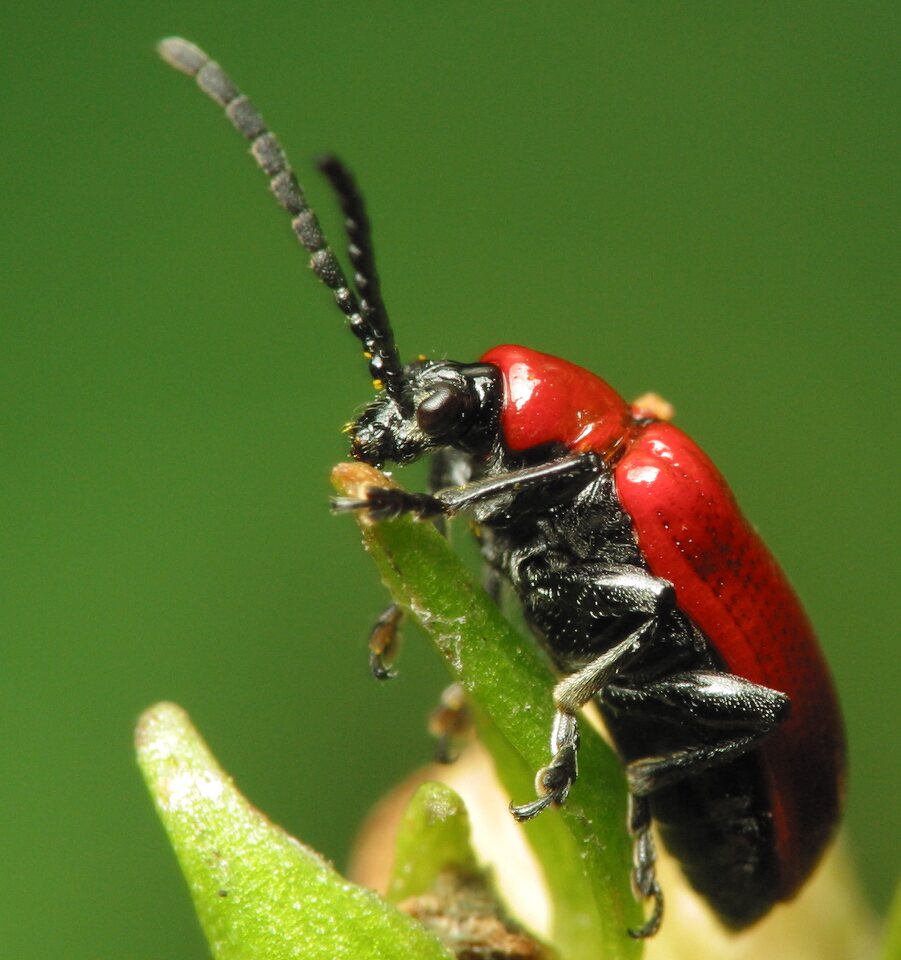
Lilioceris lilii · lelijinis čiuželis
- scarlet lily beetle, red lily beetle, lily leaf beetle
- Lilienhähnchen, Lilienkäfer
- lelijinis čiuželis, lelijinis lapgraužis
- melnkāju lilijgrauzis
- poskrzypka liliowa
en.wikipedia.org/wiki/Scarlet_lily_beetle The lily leaf beetle is indigenous to parts of Europe and Asia. It is thought to have been introduced to North America through the importation of plant bulbs in 1943. It is a leaf beetle that eats the leaves, stem, buds, and flowers, of lilies, fritillaries and other members of the family Liliaceae. It lays its eggs most often on Lilium and Fritillaria species; the survival rate of eggs and larvae is reduced on other plants.
The adult lily beetle is about 6 to 9 mm in length, with relatively long legs and antennae. Its elytra (harder forewings) are bright scarlet and shiny. Its underside, legs, eyes, antennae and head are all black. It has large eyes, a slim thorax, and a wide abdomen. Each antenna is made up of 11 segments. The eyes are notched and there are two grooves on the thorax.
The beetle overwinters in the soil and emerges early in spring. It emerges in spring to feed and mate. The female can lay up to 450 eggs each season in batches of about 12 on the undersides of leaves. It arranges the red-orange to brown eggs in narrow irregular lines along the midrib, where they are more concealed. The eggs then hatch into yellow, brown or orange larvae in about 1–2 weeks. The larvae feed for up to 24 days. Their preferred feeding locale is underneath the leaf or at the node where the leaf meets the stem. They then burrow in the ground to pupate in a cocoon of soil bound with saliva. In about 20 days they emerge as adults and continue to feed until winter. More than one cycle can occur in one year.
Kūno ilgis 6-9 mm. Tiek suaugę vabalai, tiek lervos maitinasi daugiausia lelijų lapais, nors gali graužti ir stiebus ar žiedus. Raudonai-oranžiniai kiaušinėliai nelygia linija dedami lelijų lapų apačioje. Esant palankioms oro sąlygoms kiaušinėliai subręsta per 7-10 dienų. Suaugusi patelė gali padėti ~450 kiaušinėlių, ir yra vaisinga du sezonus. Išsiritę vikšrai būna oranžinės spalvos (su geltonu, rečiau žaliu atspalviu), maitinasi lapais. Vikšrai išauga per 16-25 dienas, po to sulenda į žemę ir pavirsta lėliukėmis. Lėliukė yra oranžinės spalvos. Po 16-22 dienų pasirodo suaugę individai, kurie intensyviai maitinasi iki pat vėlyvo rudens. Naujos kartos atstovai jau nesiporuoja iki pat pavasario. Vabalai žiemoja dirvoje, renkasi sausesnes vietas po nukritusiais lapais, kompostu.
‥
0 comments
Add a comment